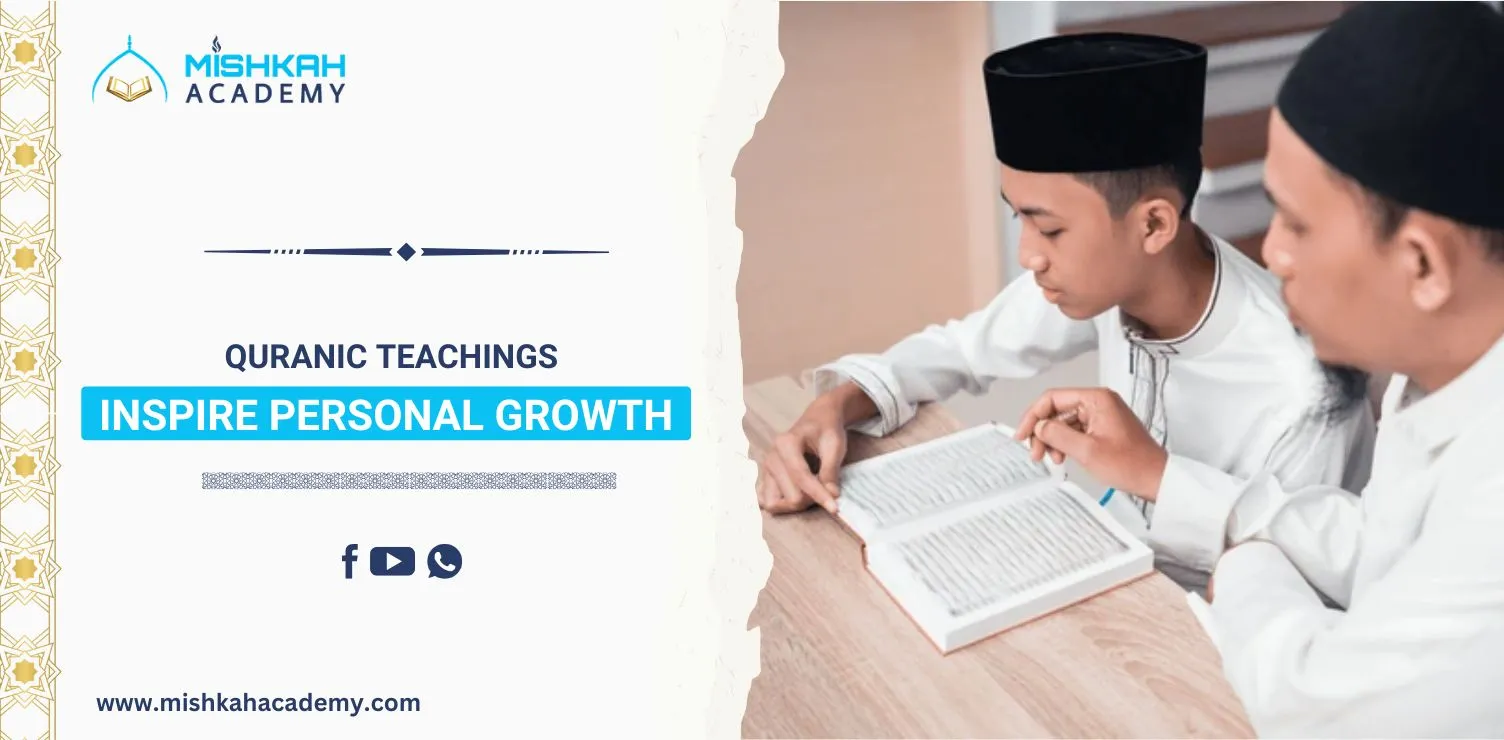Personal growth is essential for success in life, and the Quran provides unmatched guidance for Muslims seeking self-improvement. Its teachings guide men and women on how to grow mentally, spiritually, and morally.
This article highlights 10 key ways the Quran inspires personal growth, including understanding patience, gaining inner peace through Dhikr, and overcoming challenges inspired by the trials of prophets. It also focuses on justice, character-building, and achieving a balance between material and spiritual needs.
10 Ways the Quranic Teachings Inspire Personal Growth
Table of Contents
ToggleHere are some tips shared by Mishkah Academy Quran Tutors for both men and women to improve themselves while adhering to Islamic principles.
1. Seeking Purpose Through Quranic Guidance on Life
The Quran provides clear guidance to find life’s purpose. It teaches us to worship Allah and live righteously. Allah says:
“And I did not create the jinn and mankind except to worship Me.” (Surah Adh-Dhariyat, 51:56)
This verse reminds us that our ultimate goal is worshiping Allah. Beyond that, the Quran encourages reflection on creation to understand our role. For example:
- Reflecting on Allah’s signs in nature (Surah Al-Imran, 3:190-191).
- Helping others and giving charity (Surah Al-Baqarah, 2:177).
- Striving for excellence in deeds (Surah Al-Mulk, 67:2).
Each teaching helps Muslims stay focused and find meaning in life while aligning actions with faith.
2. Enhancing One’s Character via Quran’s Moral Teachings
The Quran shapes character through its moral teachings. It emphasizes honesty, kindness, and humility. Allah commands:
“Indeed, Allah commands you to render trusts to whom they are due and when you judge between people to judge with justice.” (Surah An-Nisa, 4:58)
Key morals include:
- Speaking truthfully (Surah Al-Ahzab, 33:70).
- Showing mercy to others (Surah An-Nur, 24:22).
- Avoiding arrogance (Surah Luqman, 31:18).
These verses inspire Muslims to live with integrity, treat others kindly, and follow justice in daily actions, which builds strong character and trustworthiness.
3. Understanding the Concept of Patience Through Quranic Stories
The Quran teaches patience through real-life examples of prophets. Their struggles inspire believers to stay strong in trials.
| Story | Lesson on Patience | Reference |
| Prophet Ayub (Job) | Persevering through illness and loss | Surah Sad, 38:41-44 |
| Prophet Yusuf (Joseph) | Staying patient in betrayal and imprisonment | Surah Yusuf, 12:18-34 |
| Prophet Musa (Moses) | Remaining steadfast against Pharaoh’s tyranny | Surah Taha, 20:77-79 |
| Prophet Muhammad (PBUH) | Enduring hardships during early prophethood in Makkah | Surah Al-Muzzammil, 73:10 |
These stories guide Muslims to trust Allah and stay firm during difficulties. In Islamic studies for kids children can learn all these stores deeper knowledge.
4. Enabling Discipline via Namaz (Salah)
Salah is a pillar of Islam and a tool for self-discipline. The Quran says:
“Indeed, prayer prohibits immorality and wrongdoing.” (Surah Al-Ankabut, 29:45)
Regular prayers structure the day and train Muslims to manage time wisely. Fajr motivates an early start. Dhuhr breaks midday distractions. Asr encourages perseverance. Maghrib and Isha bring reflection and gratitude.
Additionally, Salah instills accountability as believers stand before Allah daily. It helps avoid sins and promotes mindfulness in every action. For men and women, prayer strengthens self-control and ensures spiritual focus in life.
5. Gaining Inner Peace with Dhikr and Duas
The Quran emphasizes Dhikr (remembrance of Allah) for inner peace. Allah says:
“Unquestionably, in the remembrance of Allah do hearts find rest.” (Surah Ar-Ra’d, 13:28)
Some short Dhikr from the Quran include:
- SubhanAllah (Glory be to Allah)
- Alhamdulillah (All praise is due to Allah)
- Allahu Akbar (Allah is the Greatest)
- La ilaha illa Allah (There is no god but Allah)
Small daily Duas from the Quran:
- “My Lord, increase me in knowledge.” (Surah Taha, 20:114)
- “Our Lord, grant us good in this world and the Hereafter.” (Surah Al-Baqarah, 2:201)
These simple phrases calm the heart and bring blessings to daily life.
Start Your Quran Learning Journey Today6. Learning About the Great Deed That is Forgiveness
The Quran encourages forgiveness to purify the soul. Allah says:
“And let them pardon and overlook. Would you not like that Allah should forgive you?” (Surah An-Nur, 24:22)
Prophet Muhammad (PBUH) exemplified forgiveness in his life:
- Forgiving the people of Ta’if: Despite being harmed, he prayed for their guidance.
- Pardoning his enemies in Makkah: After the conquest, he declared no revenge against those who wronged him.
These examples inspire Muslims to let go of grudges and seek Allah’s mercy. Forgiveness strengthens relationships and promotes inner growth.
7. Prioritizing Justice Following Quranic Principles
Justice is a key teaching in the Quran. Allah says:
“Indeed, Allah commands you to uphold justice and to do good…” (Surah An-Nahl, 16:90)
Specific examples of justice include:
- Fair dealings in trade: “Give full measure and do not be of those who cause loss.” (Surah Ash-Shu’ara, 26:181)
- Equity in relationships: “Do not let the hatred of a people prevent you from being just.” (Surah Al-Ma’idah, 5:8)
These teachings guide Muslims to practice fairness in personal, social, and business dealings. Justice ensures harmony and accountability in society.
8. Encouraging Education as Obligated for All Believers
The Quran emphasizes the importance of knowledge. Allah says:
“Read in the name of your Lord who created.” (Surah Al-‘Alaq, 96:1)
Education helps believers grow spiritually and intellectually. Both men and women are obligated to seek knowledge. Prophet Muhammad (PBUH) said:
“Seeking knowledge is an obligation upon every Muslim.”
Understanding religious and worldly knowledge enables better decisions. For example, learning Quranic Arabic deepens one’s connection with Allah. Worldly knowledge helps Muslims contribute positively to society. This obligation inspires continuous personal growth. It helps individuals develop skills, solve problems, and lead meaningful lives, aligning with Islamic values.
9. Balancing Equality as Stressed in the Quran
The Quran highlights the equality of men and women in their responsibilities and rewards. Allah says:
“Whoever does righteousness, whether male or female… We will surely give them a good life.” (Surah An-Nahl, 16:97)
Equality fosters personal growth by promoting mutual respect. It encourages fair treatment in families, workplaces, and communities. For instance, men and women equally perform Salah and fast during Ramadan. These shared obligations remind Muslims of their equal standing before Allah.
10. Focusing on Accountability for Self-Improvement
The Quran stresses accountability for every action. Allah says:
“And every soul will be compensated for what it earned.” (Surah Al-Imran, 3:25)
Self-accountability drives personal growth. It encourages individuals to evaluate their deeds and intentions daily. Prophet Muhammad (PBUH) advised:
“The wise person holds himself accountable and works for what comes after death.”
Believers who embrace accountability grow into more honest, responsible individuals. They strive for good deeds, avoid sins, and constantly seek Allah’s mercy. This mindset leads to spiritual and moral development.
What Does the Quran Say About Growth?
The Quran beautifully explains the concept of growth as a natural and divine process. Allah states:
“… And We cause what We will to remain in the wombs for an appointed time, and afterward We bring you forth as infants, then (give you growth) until you attain your full strength…” (Surah Al-Hajj, 22:5)
This verse highlights growth as a continuous journey ordained by Allah. It encompasses physical, intellectual, and spiritual development. The stages of life—from infancy to maturity—reflect Allah’s wisdom and purpose. Growth is not just physical but includes moral and emotional refinement. The Quran encourages believers to embrace these stages, making the most of their potential to fulfill their responsibilities and serve Allah.
What Does the Quran Say About Self-Development?
The Quran urges self-development through self-reflection and introspection. Allah says:
“And in your own selves. Will you not then see?” (Surah Adh-Dhariyat, 51:21)
Self-reflection helps identify areas for improvement. When contemplating one’s actions and intentions, believers align their lives with Islamic values. The Quran encourages understanding oneself and the world, paving the way for positive change. Self-development in Islam is a journey of betterment that brings success in this world and the Hereafter.
Conclusion
The Quran serves as a timeless guide for personal growth and self-improvement. Its teachings inspire believers to cultivate patience, seek knowledge, practice discipline, and strive for a balanced life aligned with Islamic values.
Mishkah Academy stands as a pioneer in helping individuals achieve this growth. With experienced tutors dedicated to teaching Quranic principles in quran classes for kids, quran classes for adults, and quran classes for sisters. Mishkah Academy ensures that Uk, USA, Canada, Australia, and European Muslims gain profound insights for lifelong transformation.
Start Your Quran Learning Journey Today





